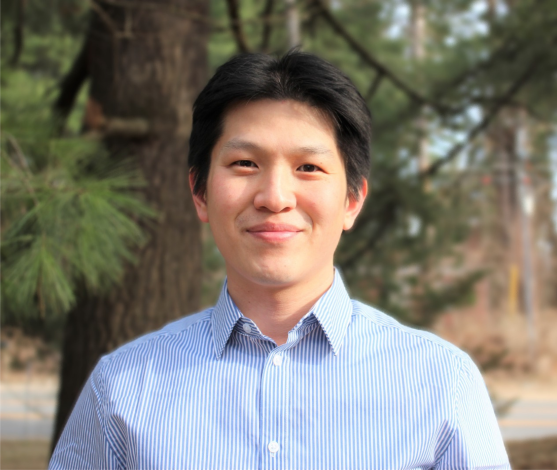Home
Hello! I am Yoehan Oh (오요한, in Korean; he/him), an interdisciplinary researcher whose work draws from Science and Technology Studies, history of computing, critical platform studies, and Asian and Asian diaspora studies. I’m working as a Postdoctoral Associate and Lecturer, both in the Department of Computer Science, Yale University (featured in an RPI announcement) since summer 2023, with mentorship by Professor Theodore Kim. I’m a member of the Asian Americans and STEM (science, technology, engineering, and mathematics) initiative at Yale.
alt text: a headshot of an East Asian man with black hair, including his shoulder, looks into the camera with a soft smile, wearing light-blue business casual dress shirt. The photo was taken outdoor, with branches and leaves of conifers as blurred background.I earned my Ph.D. degree in the Department of Science and Technology Studies, Rensselaer Polytechnic Institute, Troy, NY, the United States, working with Professor Dr. James W. Malazita. Before that, I earned a Master of Science at the Program of History and Philosophy of Science (as it formerly was, currently called the Department of Science Studies), Seoul National University (SNU), South Korea, with Science and Technology Studies (STS) major. Prior to academia, I worked for LG Electronics, a South Korea’s consumer electronics company, regarded the fourteenth top global company by Forbes as of 2017, as a software engineer for more than a half decade, after both B.S. and M.S. in Engineering degree both in the Electrical Engineering and Computer Science in SNU. You can see more in my CV page.
My work has been sponsored by the Jong Ha Scholarship Foundation (재단법인 종하장학회), and the D. Kim Foundation for the History of Science and Technology in East Asia (featured in D. Kim Foundation’s announcement of new fellows in 2022).
My postdoctoral research project is to understand the history of computer science research and professional landscapes, from the Asian American history perspective. To be specific, this interdisciplinary project looks into database systems research and commercialization community, with two focuses: (i) the database research commercialization efforts in the 1980s and 1990s era when Asian American talents and capital flowed in the U.S., and (ii) debates on the properly comprehending database research and system building efforts since the 2000s onward.
My doctoral dissertation research sought to examine transnationally dispersed sociopolitical dynamics of the contemporary information and media technologies, particularly a non-U.S. search engine as non-Western/Anglophone and non-Sino-centered/Chinese ways of building and knowing our worlds,* in national (South Korea), regional (East and Southeast Asia), transnational (US and European countries) contexts. I primarily focus on knowledge and material infrastructures and database for internet platforms; postcolonial/decolonial digital politics; political, regulatory, policy, and nationalistic discourses upon web platforms upon domestic and global internet platforms; internet histories and internet content governance; search engine algorithms and web ecology; and politics of largescale distributed computing machineries.
In addition, I also have broader interest in topics and methods in Science and Technology Studies; critical algorithms studies; critical data studies; historical and social studies of computing, information technologies, artificial intelligence, and machine learning; postcolonial computing and internet studies; social studies of data-driven mundane practices at differentiated levels, and critical openness studies in social/data practices (e.g. open web, open data, open source, open government, and the transparency of algorithms).
I use qualitative methods, drawing largely on interpretive scholarships including Science and Technology Studies and History of Technology. I have published a co-authored research paper with Professors Eun-Sung Kim and Gi Woong Yun, in Technology in Society, regarding the new materialistic treatment of the co-constitutive relations between deep learning-based computer vision algorithms and data, titled “Sociotechnical challenges to the technological accuracy of computer vision: The new materialism perspective,” (its free access PDF, expired on 11/29/23) and a co-authored review paper with Professor Sungook Hong in the Korean Journal of Science and Technology Studies, regarding algorithmic discrimination in three public sectors: criminal sentencing, predictive policing, and border securities, titled “Does Artificial Intelligence Algorithm Discriminate Certain Groups of Humans?” [인공지능 알고리즘은 사람을 차별하는가?].”
I have also presented in an array of international, East-Asia regional, and national conferences: the annual 4S conference (The Society for Social Studies of Science) at New Orleans, LA, USA; SIGCIS (Special Interest Group for Computing, Information and Society) meeting in Computer History Museum, Mountain View, CA, USA; Towards a History of Artificial Intelligence: Workshop at Columbia University, in Columbia University, NY, USA; Theorizing the Web, in New York, NY, USA; All Things in Moderation in UCLA, CA, USA; EASTS (East Asian Science, Technology and Society) network conference in Tsinghua University, Beijing, Mainland China; and Korean Association of STS‘s conferences, South Korea; among others.
I earned my M.S. degree with a thesis that examined search term moderation practices, a South Korea’s internet corporation’s accounts about its trending algorithm, and external investigators’ algorithm audit, relying on case study during the 2000’s and the 2010’s upon an internet search portal company. (Read more about my research here.)
Contact Information
Department of Computer Science
51 Prospect Street
New Haven, CT 06511-8937 USA
Email: yoehan·oh ⓐ yale·edu
* The above account is indebted to John Law for his description of research objectives himself: “He works collaboratively on mis/translation where the object is to explore possible “non-western” and non-English-language academic ways of knowing, with the aim of both provincializing and enriching social science.” in Law, John and Wen-Yuan Lin (2018) “Tidescapes: Notes on a shi (勢)-inflected Social Science.” Journal of World Philosophies 3 (Summer 2018): 1-16. doi: 10.2979/jourworlphil.3.1.01 .
